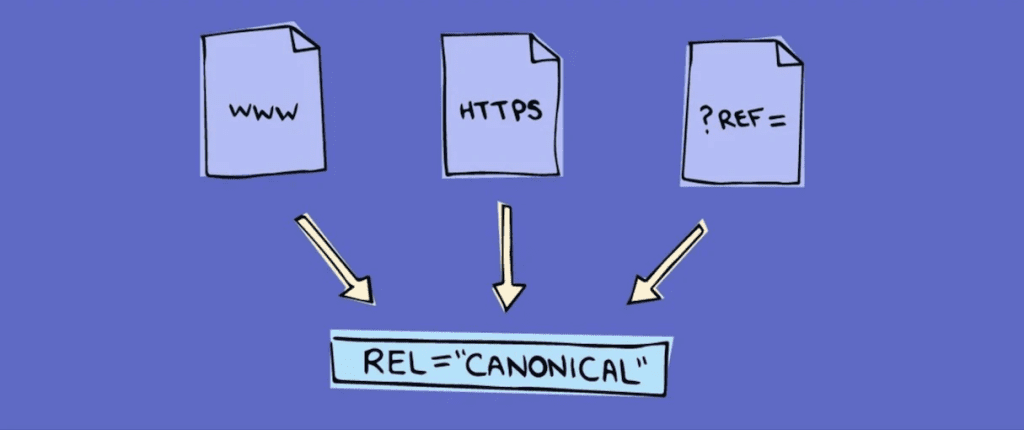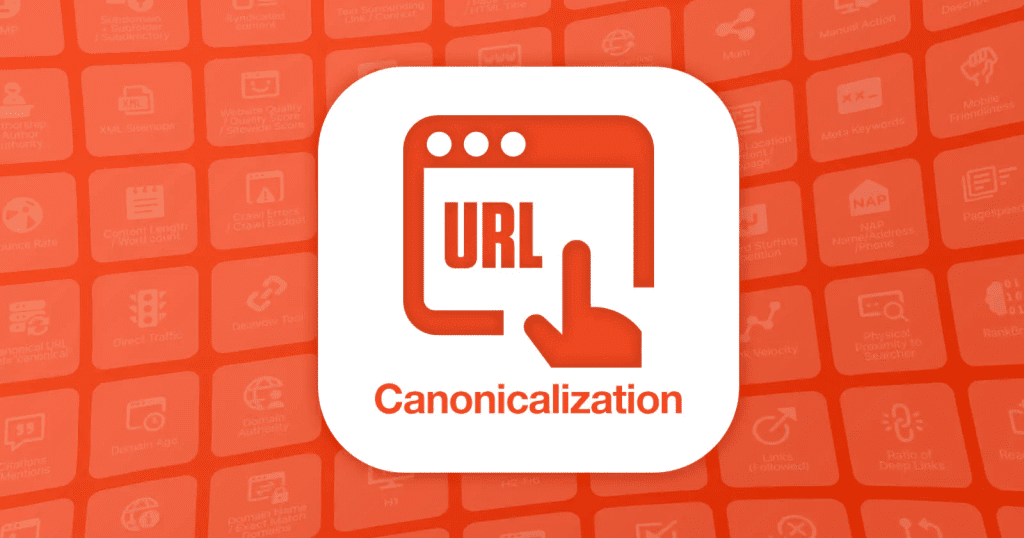Key Takeaways
- SEO Linchpin: Canonical tags are the linchpin of SEO strategy, guiding search engines through the maze of duplicate content to enhance visibility and rankings.
- Consolidating Authority: Mastering canonicalization consolidates link equity, ensuring your website’s authority remains unyielding amidst the ever-evolving search engine algorithms.
- User-Centric SEO: Canonical tags, when strategically implemented, contribute to a positive user experience by streamlining content presentation and improving page load times.
In the intricate tapestry of Search Engine Optimization (SEO), where every pixel of code and content matters, one particular element stands as a silent guardian against the chaos of duplicate content and crawling confusion: Canonical Tags.
Unassumingly nestled within the HTML of web pages, these tags play a pivotal role in shaping a website’s destiny in the digital realm.
So, if you’ve ever found yourself pondering the cryptic significance of canonical tags or wondered about their wizardry in the SEO landscape, you’re in the right place.

Unveiling the Mystery of Canonical Tags
Picture this: You’ve meticulously crafted a stellar piece of content, sculpted it with SEO finesse, and unleashed it into the vast expanses of the internet.
Yet, amidst the vast digital landscape, a subtle menace lurks – the spectre of duplicate content.
Enter Canonical Tags, the unsung heroes of SEO, poised to navigate the labyrinth of search engine algorithms and preserve the sanctity of your content.
Defining the Enigma
So, what exactly are canonical tags?
At their core, canonical tags are HTML elements that serve as beacons for search engines, guiding them to the preferred version of a particular web page.
In simpler terms, they communicate to search engines which URL should be considered as the authoritative, primary source when faced with multiple variations of the same content.
The Symphony of SEO Harmony
Canonical tags aren’t just a technicality; they are the maestros orchestrating a symphony of SEO harmony.
By preventing the dreaded spectre of duplicate content from haunting your digital presence, canonical tags ensure that search engines understand the hierarchy of your content, allowing them to rank and index it accurately.
It’s the difference between a well-choreographed dance and a chaotic melee in the eyes of search algorithms.
Navigating the Complex Terrain
To truly grasp the importance of canonical tags, it’s essential to delve into the world of canonicalization.
Imagine your website as a vast library of information, with multiple copies of the same book scattered across different shelves.
Canonicalization is the process that organizes this literary chaos, guiding search engines to the main shelf where the definitive edition rests.
The Mechanics of Canonicalization
Canonicalization works by providing search engines with a roadmap to the preferred version of a page.
It’s akin to placing a signpost in a maze, guiding users – in this case, search engine crawlers – to the most relevant and authoritative content.
As search algorithms become increasingly sophisticated, the need for an efficient canonicalization strategy becomes non-negotiable.
Common Scenarios Calling for Canonical Tags
The importance of canonical tags becomes particularly pronounced in scenarios where multiple versions of a page exist.
Whether it’s different URLs leading to the same content or variations induced by parameterized URLs, canonical tags serve as the unifying force that ensures search engines don’t get lost in the labyrinth of duplicate content.
In the subsequent sections of this comprehensive guide, we’ll unravel the myriad benefits of canonical tags, explore the best practices for their implementation, and equip you with the tools to troubleshoot canonicalization issues.
Embark on this journey with us, and discover how canonical tags can elevate your website’s SEO prowess to new heights.
As we delve into the intricacies of this SEO enigma, you’ll emerge with a profound understanding of why canonical tags aren’t just a technicality – they are the guardians of your digital legacy.
Let’s unravel the potential of 2024 and craft campaigns that not only capture attention but leave an indelible mark on the hearts and minds of your audience. The journey to marketing excellence begins here.
But, before we venture further, we like to share who we are and what we do.
About AppLabx
From developing a solid marketing plan to creating compelling content, optimizing for search engines, leveraging social media, and utilizing paid advertising, AppLabx offers a comprehensive suite of digital marketing services designed to drive growth and profitability for your business.
AppLabx is well known for helping companies and startups use website marketing analysis to drive web traffic to their websites and web apps.
At AppLabx, we understand that no two businesses are alike. That’s why we take a personalized approach to every project, working closely with our clients to understand their unique needs and goals, and developing customized strategies to help them achieve success.
If you need a digital consultation, then send in an inquiry here.
Canonical Tags: What Are They and Why Are They Important for SEO?
- Understanding Canonicalization
- Key Benefits of Canonical Tags
- When to Use Canonical Tags
- Best Practices for Implementing Canonical Tags
- Impact of Canonical Tags on SEO
- Tools for Managing Canonical Tags
1. Understanding Canonicalization
In the vast expanse of the digital realm, understanding canonicalization is akin to deciphering the intricate threads that weave the fabric of coherent SEO strategy.
Let’s embark on a journey into the heart of canonicalization, unravelling its complexities and shedding light on its indispensable role in the optimization landscape.

Definition and Purpose
Canonicalization, in the context of SEO, is the process of defining the canonical or preferred version of a web page when multiple versions of similar content exist.
This is crucial for search engines as it helps them understand which URL should be prioritized for indexing and ranking.
The primary goal is to eliminate confusion and ensure that the search engine presents users with the most relevant and authoritative version of a page.
How Canonicalization Works
Think of canonicalization as the GPS for search engine crawlers navigating the vast digital landscape.
The canonical tag, a snippet of HTML code, is employed to declare the preferred version of a page.
When a search engine encounters multiple versions of similar content, the canonical tag guides it to the selected URL, steering clear of potential duplicate content pitfalls.
Example: Consider an e-commerce site with product pages accessible via both HTTP and HTTPS.

Canonicalization would involve specifying the preferred protocol using canonical tags, ensuring that search engines prioritize one version over the other, and preventing duplicate content issues.
Common Scenarios Where Canonicalization is Crucial
Canonicalization comes to the forefront in various scenarios where content duplication can sow confusion among search engines.
Recognizing these scenarios is essential for implementing a robust canonicalization strategy.
URL Variations
Example: Your website may have both www and non-www versions, leading to the same content.
Canonicalization helps in specifying the preferred version and consolidating ranking signals.

Parameterized URLs
Example: E-commerce platforms often use parameterized URLs to filter products.
Canonical tags guide search engines to the canonical URL, preventing the indexing of numerous parameter variations.
Mobile and Desktop Versions
Example: With the rise of mobile-first indexing, having both mobile and desktop versions of a page necessitates canonicalization to signal the preferred version to search engines.
Why Canonicalization Matters
Canonicalization isn’t just a technical nuance; it is the linchpin holding together a coherent SEO strategy.
Its importance extends beyond the prevention of duplicate content issues.
Here are key reasons why canonicalization matters:
Crawling Efficiency
Canonicalization streamlines the crawling process by guiding search engine bots to the preferred version, ensuring optimal resource utilization.
Link Equity Consolidation
Canonical tags consolidate link equity, preventing its dilution across multiple versions and strengthening the authority of the preferred URL.
User Experience Enhancement
Fast-loading pages contribute to a positive user experience.
Canonicalization aids in avoiding redundant crawling of duplicate content, allowing search engines to focus on delivering the most relevant results quickly.
2. Key Benefits of Canonical Tags
Canonical tags are the unsung heroes of SEO, quietly steering search engines through the labyrinth of duplicate content and indexing challenges.
In this section, we’ll unravel the key benefits of incorporating canonical tags into your SEO strategy, backed by insights, examples, and data-driven evidence.

Prevention of Duplicate Content Issues
Duplicate content is a notorious adversary in the realm of SEO, capable of diluting rankings and confusing search engines.
Canonical tags emerge as knights in shining armour, safeguarding your digital kingdom from the perils of content duplication.
Example: Consider a blog post available in both the HTTP and HTTPS versions.
Canonical tags can be employed to designate the HTTPS version as the canonical URL, preventing search engines from treating both as distinct entities and mitigating the risk of duplicate content penalties.
Consolidation of Link Equity
Link equity, often referred to as “link juice,” is the currency of the digital realm. It represents the authority passed from one page to another through hyperlinks. Canonical tags play a pivotal role in consolidating and preserving this valuable link equity.
According to a study by Ahrefs, the number of referring domains to a page correlates more closely with organic traffic than the DR of the ranking website.
Canonicalization ensures that all link signals point to the canonical URL, fortifying its authority in the eyes of search engines.
Improved Crawl Efficiency for Search Engines
Efficient crawling is the heartbeat of search engine operations. By guiding search engine bots to the preferred version of a page, canonical tags contribute to streamlined crawling processes, enhancing the overall efficiency of the indexing mechanism.
Canonicalization assists in this process by signalling the primary version of a page, reducing the likelihood of search engines wasting resources on redundant crawls.
Enhanced User Experience
SEO isn’t just about algorithms; it’s about providing a seamless and satisfying experience for users.
Canonical tags indirectly contribute to a positive user experience by ensuring that search engines deliver the most relevant and authoritative content promptly.
- Example: Consider an e-commerce website with category pages accessible through multiple filter options. Canonical tags can be employed to guide search engines to the main category page, ensuring that users are directed to the most comprehensive and relevant content.
- A study indicates that 47% of customers expect a website to load in 2 seconds or less. Canonicalization aids in faster page loading by preventing search engines from crawling and indexing duplicate content, contributing to a more efficient user experience.
SEO Impact and Competitive Advantage
Canonicalization isn’t just a technicality; it’s a strategic weapon in the arsenal of SEO professionals.
Embracing canonical tags provides a competitive edge by ensuring that your website is optimized for search engine algorithms, leading to improved rankings and visibility.
Canonical tags, as a crucial on-page SEO element, contribute significantly to this effectiveness.
3. When to Use Canonical Tags
Understanding the optimal scenarios for deploying canonical tags is pivotal for steering clear of duplicate content pitfalls and maximizing the effectiveness of your SEO strategy.
In this section, we’ll delve into key situations where the judicious use of canonical tags becomes paramount.

Identifying Duplicate Content
Duplicate content is a silent menace that can wreak havoc on search engine rankings.
Recognizing instances where canonicalization is crucial involves identifying scenarios where similar or identical content exists in different locations.
Example: Imagine a product page accessible through multiple URLs due to URL parameters or session IDs.
Canonical tags can be utilized to designate the primary URL as the canonical version, preventing search engines from indexing and ranking each variant separately.
Dealing with Multiple Versions of a Page
In the dynamic landscape of the internet, pages often exist in multiple versions, such as HTTP and HTTPS, www and non-www, or mobile and desktop versions. Canonical tags play a pivotal role in guiding search engines to the preferred version.
Websites with an HTTPS connection are more likely to appear higher in search engine results pages. Canonicalization ensures that search engines prioritize the secure version of a page, contributing to improved rankings and user trust.
Handling Parameterized URLs
E-commerce websites, in particular, frequently use parameterized URLs to facilitate product filtering and sorting. However, these variations can lead to content duplication issues. Canonical tags offer a strategic solution in such scenarios.
Example: Consider an online store where users can filter products based on price, color, or size, resulting in different URLs for similar content.
Canonicalization can be employed to guide search engines to the primary, unfiltered version, consolidating link equity and avoiding duplicate content penalties.
Managing Content Syndication
Content syndication, while beneficial for reaching wider audiences, can introduce challenges related to duplicate content. Canonical tags can be employed to signal search engines about the authoritative source of the content.
According to a report, content marketing generates 3x the number of leads than outbound marketing and costs 62% less. Canonicalization ensures that search engines attribute the SEO value of syndicated content to the original source, preventing potential ranking dilution.
Understanding when to use canonical tags involves a keen awareness of your website’s structure and content distribution.
The examples and insights provided above underscore the versatility of canonicalization in addressing diverse scenarios and ensuring a streamlined and optimized presence in search engine results.
4. Best Practices for Implementing Canonical Tags
Navigating the complexities of canonical tag implementation demands a meticulous approach, blending technical precision with strategic finesse.
In this exhaustive section, we’ll dissect the best practices that transform canonical tags from mere HTML annotations into powerful instruments for optimizing your website’s SEO.

Proper Tag Placement in HTML
Ensuring the correct placement of canonical tags within the HTML structure is foundational to their efficacy.
Proper placement facilitates accurate interpretation by search engines, guiding them to the preferred version of a page.
Best Practice
Location Matters: Embed the canonical tag within the <head> section of the HTML, clearly specifying the canonical URL using the rel=”canonical” attribute.
Ensuring Consistency Across Different Versions
Maintaining coherence in canonical tags across diverse versions of a page is paramount for conveying a uniform signal to search engines.
Inconsistencies can introduce confusion, undermining the effectiveness of canonicalization.
Best Practice
Uniformity is Key: Ensure the canonical tag remains consistent across all versions of a page. Whether contending with HTTP vs. HTTPS, www vs. non-www, or other variations, the canonical tag should steadfastly point to the preferred version, leaving no room for ambiguity.
Handling Dynamic and Frequently Changing Content
Websites characterized by dynamic or frequently evolving content necessitate a thoughtful approach to canonicalization.
Adapting canonical tags to content changes is essential for preserving their relevance in such dynamic environments.
Best Practice
Dynamic Strategies: Implement dynamic canonicalization strategies, especially for content subject to frequent modifications.
Consider an e-commerce site dynamically generating canonical tags based on user-selected filters, guiding search engines to the most pertinent version.
Common Mistakes to Avoid
In the intricate realm of SEO, sidestepping common pitfalls is as pivotal as embracing best practices. Recognizing and evading these mistakes ensures that canonical tags fulfill their intended purpose without unintended consequences.
Neglecting Updates: Neglecting to update canonical tags when content undergoes substantial changes can be detrimental. Failing to synchronize canonical tags with actual content changes may lead to inaccurate indexing and potential SEO complications.
Data-Driven Decision Making
In the dynamic landscape of SEO, staying informed and data-driven is emblematic of successful optimization. Regularly monitoring the performance of canonicalized pages and making informed adjustments based on data insights is a hallmark of strategic SEO management.
Regularly monitoring page load times for canonicalized pages ensures that the SEO benefits of canonicalization align with a positive user experience.
5. Impact of Canonical Tags on SEO
Canonical tags, often operating silently within the code of web pages, wield significant influence over a website’s SEO performance.
In this extensive exploration, we’ll unravel the multifaceted impact of canonical tags on SEO.
Understanding this impact is crucial for navigating the intricate landscape of search engine optimization.

Positive Effects on Search Engine Rankings
Canonical tags act as SEO conductors, orchestrating the symphony of search engine algorithms to enhance a website’s ranking.
Their primary role is to guide search engines to the preferred version of a page, consolidating ranking signals and fortifying a page’s authority.
Canonicalization, as a crucial on-page factor, contributes to a website’s overall performance in search engine rankings.
Comparison with Other SEO Techniques
Canonical tags don’t operate in isolation; they interact with various SEO techniques to collectively shape a website’s performance.
Understanding how canonicalization compares with other strategies provides insights into its unique contribution.
Content Quality vs. Canonicalization: While high-quality content is a cornerstone of SEO, canonicalization complements content strategies by ensuring that the value of that content is concentrated on the preferred URL.
The synergy between quality content and canonical tags reinforces a website’s overall SEO effectiveness.
Quantifying the Impact: Data-Driven Metrics
Measuring the impact of canonical tags requires scrutiny of key metrics that reflect a website’s performance.
Analyzing data-driven metrics provides a tangible understanding of how canonicalization influences SEO outcomes.
Canonical tags contribute to link equity consolidation, preventing dilution across multiple versions and strengthening the authority of the preferred URL.
Navigating Evolving Search Engine Algorithms
As search engines continuously refine their algorithms, the impact of canonical tags adapts to these changes.
Staying attuned to evolving trends ensures that canonicalization remains a resilient and effective strategy.
Mobile-First Indexing: With Google’s shift towards mobile-first indexing, canonical tags play a crucial role in signalling the preferred version, whether it’s a mobile or desktop page. This adaptation underscores the ongoing relevance and impact of canonicalization.
6. Tools for Managing Canonical Tags
Effectively managing canonical tags is a strategic imperative for optimizing a website’s SEO performance.
In this exhaustive exploration, we’ll delve into the arsenal of tools designed to streamline the implementation, monitoring, and troubleshooting of canonical tags.
Each tool is accompanied by practical insights, examples, and, where relevant, data-driven statistics to empower you in mastering the nuanced landscape of canonical tag management.

Google Search Console: Unveiling Insights into Indexing Status
Google Search Console, a quintessential tool for webmasters, provides invaluable insights into a website’s indexing status, including the handling of canonical tags.
Index Coverage Report: Google Search Console’s Index Coverage Report offers a detailed breakdown of how Googlebot interacts with canonical tags. It reveals the status of indexed pages, highlighting potential issues related to canonicalization.
Moz: Comprehensive SEO Insights
Moz, a renowned SEO tool, offers features that aid in the management and monitoring of canonical tags, contributing to a holistic understanding of a website’s SEO health.
Site Crawl: Moz’s Site Crawl feature systematically analyzes a website’s structure, identifying canonicalization issues such as missing or misconfigured tags. This insight empowers users to rectify issues promptly.
Businesses with consistent NAP information on all directories and listings have a 350% higher likelihood of ranking higher in local search results. Canonicalization ensures similar consistency in digital content presentation.
Semrush: Uncovering Canonicalization Opportunities
Semrush, a comprehensive SEO suite, encompasses tools that aid in uncovering canonicalization opportunities and optimizing a website’s overall SEO strategy.
Site Audit: Semrush’s Site Audit tool scrutinizes a website’s technical SEO elements, including canonical tags. It identifies pages with missing or suboptimally configured canonicalization, guiding users towards corrective actions.
A study by Backlinko reveals that longer content tends to accumulate more backlinks compared to short blog posts. Canonicalization ensures that long-form content on a website contributes optimally to SEO rankings without being fragmented across different URLs.
Yoast SEO Plugin: WordPress Convenience
For WordPress users, the Yoast SEO plugin offers a user-friendly interface that simplifies the implementation and management of canonical tags.
Canonicalization Settings: Yoast SEO allows users to set canonical URLs directly within the plugin, streamlining the process of designating preferred versions of pages and preventing common canonicalization errors.
Ahrefs: Link Equity Monitoring and Analysis
Ahrefs, a robust SEO tool, extends its functionality to include features that facilitate the monitoring and analysis of link equity consolidation through canonicalization.
Backlink Analysis: Ahrefs’ Backlink Analysis tools enable users to assess how link equity is distributed across different versions of a page. This insight aids in evaluating the effectiveness of canonical tags in consolidating link signals.
The more backlinks from unique websites (referring domains) you have, the more traffic you’re likely to get. Canonicalization, by consolidating link equity, contributes to the enhancement of a page’s authority in the eyes of search engines.
Google Analytics: User Experience and Behavior Analysis
While primarily renowned for its analytics capabilities, Google Analytics indirectly aids in the evaluation of canonical tag impact through user experience and behavior analysis.
Behavior Flow Analysis: Google Analytics Behavior Flow analysis allows webmasters to observe user interactions with canonicalized pages. Monitoring user engagement provides insights into the positive impact of canonicalization on user experience.
Screaming Frog SEO Spider: In-Depth Crawling Analysis
Screaming Frog SEO Spider is a powerful desktop application that facilitates in-depth crawling analysis, offering insights into canonicalization issues and opportunities.
Canonical Tag Analysis: The SEO Spider tool identifies and analyzes canonical tags across a website. It provides a comprehensive overview of canonicalization implementation, aiding in the detection and resolution of issues.
Conclusion
In the intricate tapestry of Search Engine Optimization (SEO), where algorithms reign supreme and digital visibility is paramount, the unassuming heroes known as canonical tags emerge as the guardians of website integrity and ranking prowess.
As we embark on this SEO odyssey, we’ve journeyed through the labyrinth of canonicalization, exploring its definition, mechanics, and unrivaled significance in shaping a website’s destiny.
Now, as we draw the curtains on our exploration of “Canonical Tags: What Are They and Why Are They Important for SEO?” it’s time to distill the essence of our insights into a comprehensive and illuminating conclusion.
Canonical Tags: A Symphony of SEO Precision
Canonical tags, encoded within the HTML of web pages, function as beacons guiding search engine crawlers through the intricate terrain of duplicate content and variant URLs.
Their purpose is nothing short of orchestrating a symphony of SEO precision, ensuring that a website’s content hierarchy is clear, link equity is consolidated, and user experience remains optimal.
The Pillars of SEO Integrity
Our journey through the intricacies of canonicalization has unveiled the pillars upon which SEO integrity stands tall.
From preventing the insidious specter of duplicate content to consolidating the currency of the digital realm—link equity—canonical tags emerge as the linchpin holding together the structure of a well-optimized website.
Strategic Implementation: Best Practices in Action
Delving into the best practices for implementing canonical tags, we’ve navigated the nuanced landscape of tag placement, consistency across versions, and dynamic content adaptation.
These practices, reinforced by examples and real-world insights, serve as a roadmap for practitioners, guiding them toward a seamless integration of canonicalization into their SEO arsenal.
The Impact: Elevating SEO Excellence
The impact of canonical tags on SEO is profound and multifaceted. From enhancing search engine rankings to synergizing with other optimization strategies, canonicalization proves to be a cornerstone of SEO excellence.
Tools of Empowerment: Streamlining Canonical Tag Management
In the toolbox of SEO empowerment, we’ve explored a myriad of tools designed to streamline the management of canonical tags.
From Google Search Console offering insights into indexing status to Moz providing comprehensive SEO insights, these tools empower webmasters to wield canonicalization with precision and efficiency.
If you are looking for a top-class digital marketer, then book a free consultation slot here.
If you find this article useful, why not share it with your friends and business partners, and also leave a nice comment below?
We, at the AppLabx Research Team, strive to bring the latest and most meaningful data, guides, and statistics to your doorstep.
To get access to top-quality guides, click over to the AppLabx Blog.
People also ask
Why are canonical tags important in SEO?
Canonical tags are crucial in SEO for eliminating duplicate content issues and guiding search engines to the preferred version of a page. They consolidate link equity, prevent dilution, and contribute to efficient crawling, enhancing a website’s visibility, authority, and overall performance in search engine rankings.
What is a canonical name in SEO?
In SEO, a canonical name refers to a preferred, canonical URL chosen to represent a piece of content. It helps search engines avoid indexing duplicate content variations, consolidates ranking signals, and ensures accurate representation of a web page’s authority and relevance in search engine results.
What is a canonical tag in Google?
In Google, a canonical tag is an HTML element specifying the preferred version of a webpage. It guides search engines to index the specified URL, helping prevent duplicate content issues and consolidating ranking signals for more accurate and efficient search engine results.




































